The creators of tomato paste are the home cooks of Italy that made tomato paste in their kitchens for the first time. The definitions of tomato paste, puree, sauce and all the other tomato products are very similar yet very different. The process is almost the same but the end products are so much different than one another. Although they can be substituted for one another they are indeed different.
- Tomato puree
A thick sauce called tomato puree is created from tomatoes that have been boiled for a short time and then strained in some manner. Fresh tomatoes may be prepared into tomato puree by removing the skin and seeds, then processing the tomatoes in a food processor on the puree setting.
Salt and an acidic substance, such as lemon juice, are added while the tomatoes are being pureed. Tomato puree that has already been produced is available in cans or tubes at the grocery store. The readymade puree must be used very soon after being opened to avoid spoiling. After opening, tomato puree from a can only last a few days but tomato puree from a tube can last for nearly a month.
- Tomato paste
Tomato paste is a tomato sauce that has been boiled and cooked for a very long period, transforming it from a paste to a thicker consistency. To get rid of the tomato seeds and skins, the tomato paste is filtered after it has been cooked for a time. In order to obtain the paste-like consistency, it is then boiled for an extended period of time.
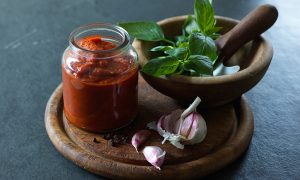
The taste of the tomatoes isn’t as sharp and acidic as it is in fresh tomatoes since tomato paste is cooked for such a long time. Instead, a sweet, robust taste emerges that may give your foods a deep, tomato-flavored punch.
- Tomato sauce
The consistency of canned tomato sauce is thinner than that of tomato puree. It is created using tomato puree, although, for taste, water and spices may sometimes be added. Garlic, onion, basil, and oregano may all be used as seasonings in tomato sauce. Tomato sauce doesn’t have as much cooking time as tomato paste, thus its taste might be more acidic. The flavor won’t be as sweet as tomato paste either.
Tomato puree wiki
Tomato purée is defined differently in each nation. Tomato purée is a manufactured food item available in the United States that typically solely contains tomatoes, however it may sometimes come in seasoned form. In terms of consistency and composition, tomato purée varies from tomato sauce or tomato paste; it often doesn’t have the same ingredients as a full tomato sauce and isn’t as thick.
Tomato puree should have a natural total soluble solids content of greater than or equal to 7% but less than 24%. A tomato purée that has been strained to remove seeds and skins is called passata di pomodoro. Passata is derived from the Italian word passare, which means “to go through.”
Cooked and strained tomatoes are combined to create tomato purée. By combining ripe tomatoes, salt, and citric acid (similar to lemon juice) in a blender or food processor, tomato purée is given a rich, acidic flavor. You may produce purée at home using ripe plum or Roma tomatoes instead of the canned purée that is often offered as a tomato product.
You may use tomato puree in place of your own homemade tomato paste to save running to the shop. Continue reading for a brief explanation of how to switch tomato paste for tomato purée and vice versa.
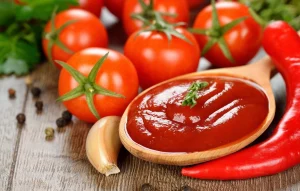
Tomato paste may be replaced with tomato puree. In a 1:3 ratio, purée may be used in place of paste. Use three tablespoons of puree for every tablespoon of tomato paste called for in the recipe. Puree should be heated in a saucepan until the water content is reduced and the consistency becomes pastier.
Tomato puree meaning
A thick liquid called tomato puree is created by cooking and straining tomatoes. Typically, no more water is added to the whole-tomato puree. Typically, the tomatoes used to make puree are just briefly cooked. It is a common ingredient in many tomato-based cuisines all around the globe and may be produced from home or purchased pre-made at the grocery store.
Tomato puree is often mistaken for other processed foods like tomato sauce or paste. The additional components and smoothness make tomato puree different from tomato paste or sauce. Spices and other veggies are added to tomato sauce, which is often thinner than puree, to make a ready-to-use mixture. Although the tomatoes are simmered for a much longer time before being mashed, tomato paste may be a thick purée.
Tomato puree, sauce, and paste may sometimes be swapped for one another despite the variations among the many tomato products. In certain recipes, the words sauce and puree are used in turn. Tomato Puree is especially used in other cuisines because of its special attributes.
You may use canned tomatoes or fresh tomatoes to make this thick tomato product. Crushed, slow-cooked tomatoes are often used to make homemade puree, which is then manually canned or jarred. The puree you buy at the supermarket is often canned by a company that makes tomato products. There are several tomato product manufacturers, providing customers with a wide range of brand options.
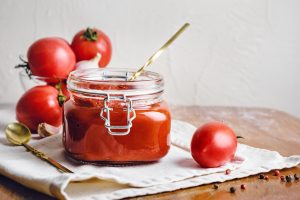
Making your own tomato puree at home is possible using a machine that mills tomatoes. Some of these devices squeeze the tomato juice and pulp out using a manual crank to filter the tomatoes. Other electric devices can strain tomatoes with the push of a button. Either device is meant to make the process of making homemade tomato puree fast and simple.
Tomato sauce used for
You’ve prepared a large quantity of jars filled with fresh tomato sauce; here are some suggestions for using it (beyond pasta, of course).
- By using eggs. For a scrumptious and wholesome start to the day, cook the eggs in the sauce over low heat until the yolks have completely solidified.
- The chutney. After the ginger and lemongrass have been cooked, the tomato sauce should be added. Before serving, season the sauce with lime and cilantro, and then use it as a dipping sauce for shrimp.
- accompanied by fish White fish, such as cod, may be poached in tomato sauce to impart an abundance of flavor to the fish.
- With risotto or polenta. Place a dollop of the fiery sauce in the bottom of a wide bowl and cover it with either a mushroom risotto or polenta.
- Served with bean stew. For a meal that is both simple and scrumptious, try cooking white beans in tomato sauce and giving them a little boil at the end. However, you must ensure that the beans are thoroughly cooked before adding them to the sauce since tomatoes prevent beans from becoming soft.
- Grilled cheese. Before cooking, spread a very thin layer of sauce over the inside of the sandwich.
- Curry. Transform the sauce from Italy into a rich version from India. Ginger, jalapeno, more garlic, and curry powder are toasted in a pan until fragrant; next, tomato sauce and half as much coconut milk are added. Cook over low heat until the flavors are able to combine, then season with sugar, salt, and cilantro.
- Vegetable noodles. You may serve spaghetti squash by tossing strands of summer or winter squash with tomato sauce and then serving it.
- Clams, mussels, and other bivalves Shellfish are best prepared by steaming them in tomato sauce until their shells split apart; the briny liquids will season the sauce.
- Okra. This late-summer vegetable should be cooked whole in tomato sauce until it is soft, at which point it may be served either hot or at room temperature.
Definition of tomato purée
There is a likelihood that you are not utilizing enough tomato purée in your recipes. Tomato purée is a speedier alternative to preparing and freezing a bushel of fresh tomatoes for individuals who lack the necessary time. Tomato purée may be used to produce sauces, stews, and soups.
It may be used to make a colorful side dish or an impressive paella with rice and seafood. Oh, and it’s an excellent base for producing your own barbecue sauce. You just need a knife, a blender, and a few minutes of your time to prepare tomato purée that can be used throughout the year.
Tomates that have been perfectly puréed
For purée, plum or Roma tomatoes are preferred since they are often cultivated for preservation. They are used to produce pasta, oven-dried tomatoes, and sauce due to their strong flavor and low water content. To prepare tomato purée, you need just remove the imperfect or damaged portions of the tomato and cut the remaining.
To remove the seeds from the tomatoes, split them in half lengthwise. It is possible to make the purée bitter by combining the remaining tomatoes with the purée. I do not peel the tomatoes while preparing purée since the skins are soft and blend well with the remainder of the tomato. When preparing a purée without skin, peel the tomatoes with a sharp serrated peeler before halving and quartering them.
Create a puree or blend
According to many purists, a food mill is a preferred tool for making tomato purée, however, an immersion blender, food processor, or standard blender may also be used to quickly purée the tomatoes. It is OK to use an immersion blender to purée ingredients in a pot. Before using a food processor or stand blender to pulse the tomatoes, they should be allowed to cool for around 10 minutes. Depending on the size of your blender, you may need to work in portions.
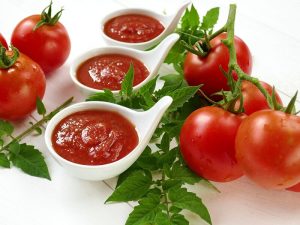
Roasted tomato paste
Ingredients
- 6 kg Roma tomatoes (12 lbs)
- 1 tablespoon salt (OR non-bitter, non-clouding salt sub; optional)
- 4 tablespoons lemon juice (bottled. OR 1 teaspoon citric acid)
Instructions
- 350°F/175°C oven temperature.
- Wash and core tomatoes.
- Half-cut the tomatoes.
- Remove tomato seeds using a squeeze or a spoon.
- On baking pans, arrange tomato halves in a single layer with the cut side up.
- Till tomato skins are wrinkled and beginning to brown, roast the tomatoes.
- tomatoes from the oven, and allow them cool until they are safe to handle.
- Pinch the peels off the tomato halves to remove them.
- Tomato halves are blended in a food processor.
- In a bowl, add tomato purée. Add the salt (if used) and either the lemon juice OR the citric acid.
- On a baking sheet, spread the purée out evenly.
- 350°F for 175°C of baking.
- Stir the purée every 20 to 30 minutes, paying close care to the edges to avoid scorching.
- When the paste is very thick and dark crimson, it is ready.
- Heat up several 125 ml (4 oz) jars, then add the hot tomato paste.
- Leave a headspace of 1 cm (1/4 inch).
- Headspace should be de bubbled.
- Wash the jar rims.
- fix the lids.
- Process in a steam or water bath canner.
- For 40 minutes, process the jars. In accordance with your height, extend the time.
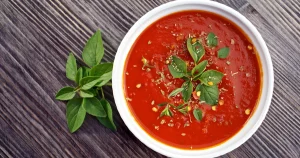
Recipe notes
- You may use another paste-type tomato for the Roma.
- The safety of this recipe is guaranteed by the citric acid/lemon juice combination and the heat processing. Do not omit either action.
- You’ll need 40 to 45 big Roma tomatoes for the tomatoes.
- You may use another paste-type tomato for the Roma.
- To lay out on the baking sheet, there was a total of 2 liters or quarts of tomato purée.
- To make cleaning simpler, we coated the baking pan with tin foil.
- It is quite challenging to entirely eliminate air pockets from the paste in the jars. One appearing on one side makes another emerge on the other side.
Classic tomato sauce
Surprisingly simple, making spaghetti sauce from home is. You’ll wonder why you were so reliant on jarred spaghetti sauces after giving it a try. This recipe creates a gorgeous, robust crimson sauce that will be the highlight of any pasta dinner. Even on a hectic weekday, it takes just a few minutes to prepare since it only requires a few cupboard essentials, including tinned tomatoes.
As many chefs create tomato sauce as there are recipes for it. It’s simple to adjust this sauce to your preferences or the food you’re preparing. For instance, omitting the tomato paste results in a thinner sauce while adding richness and thickening. For a pasta main meal with additional substance, you may also adjust the spice to suit another recipe or add veggies or meat. For a quick and delectable spaghetti and meatball meal, one family favorite is to boil up some meatballs, either handmade or frozen.
Ingredients
- 3 tablespoons olive oil
- 1 large onion, finely chopped (about 2 cups)
- 2 cloves garlic, finely minced
- 2 (28-ounce) cans of crushed tomatoes in puree
- 3 tablespoons tomato paste
- 1 teaspoon dried oregano
- 1/2 teaspoon dried basil
- 1 pinch of red pepper flakes
- 1/2 teaspoon salt (kosher or coarse), or more to taste
- Fresh black pepper, to taste
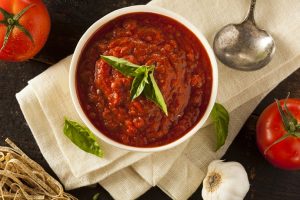
Instructions
- assemble the components.
- In a large saucepan, like this one from Amazon, heat the olive oil over medium heat. Add the onion and sauté for 7 minutes or until fork-tender. Next, add the garlic and simmer for 1 minute.
- Tomatoes, tomato paste, oregano, basil, and red pepper flakes, if desired, should all be added. Bring sauce to a simmer after adding salt and pepper.
- Reduce heat to medium-low, cover, and simmer for approximately 20 minutes, or until sauce slightly thickens. If necessary, taste and add additional salt.

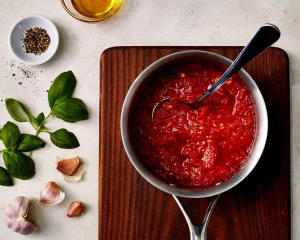
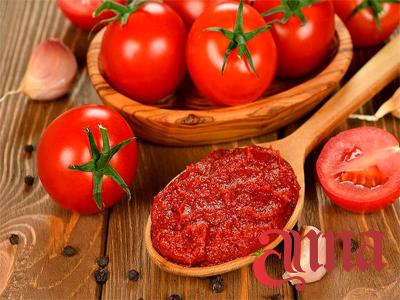
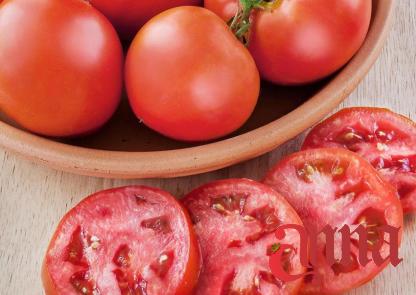
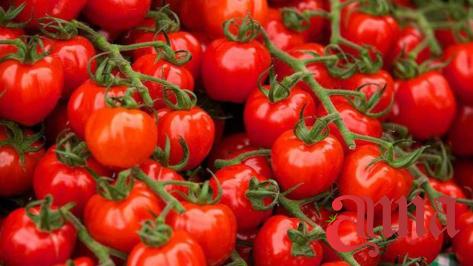
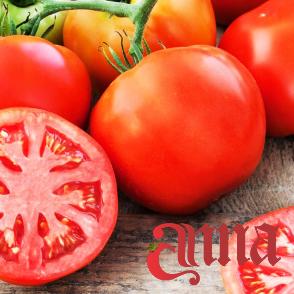
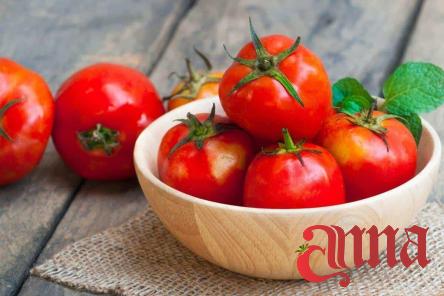
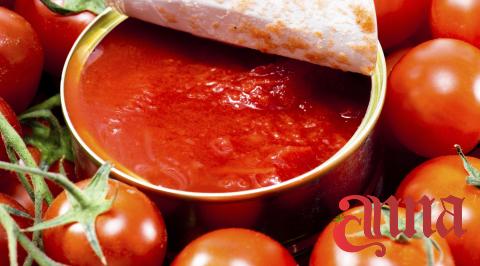
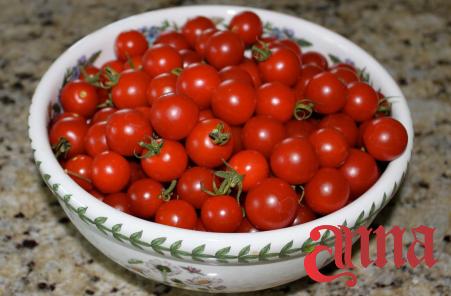
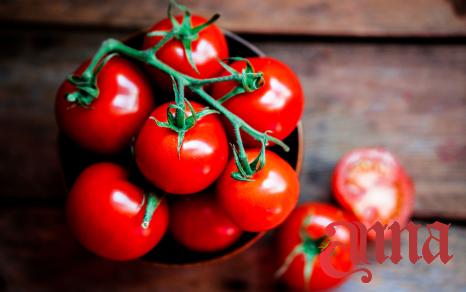
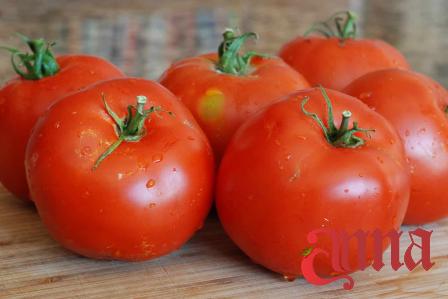
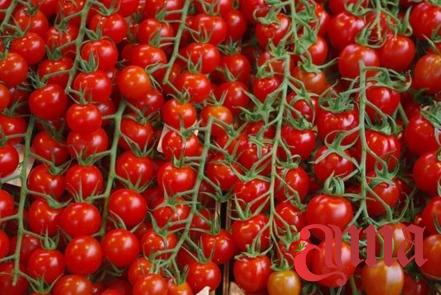
Your comment submitted.